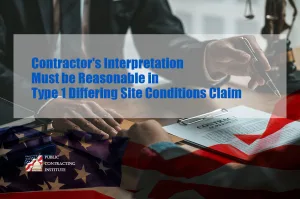Contractor’s Interpretation Must be Reasonable in Type 1 Differing Site Conditions Claim.

The Federal Circuit recently discussed the requirements of a “differing site conditions” claim under the appropriate contract clause. U.S Army Corps of Engineers v. John C. Grimberg, Co., Inc., No. 2019-1608 (Fed. Cir, June 9, 2020). The question in the case was whether Grimberg was entitled to an equitable adjustment for construction of a Navy Medical Biological Defense Research Lab (“Biolab”) at Ft. Detrick, MD.
The solicitation included the differing site conditions clause, FAR 52.236-2. The solicitation also included, as an appendix, a Geotechnical Report which disclosed 56 test borings to indicate subsurface conditions at the project location. Eleven of the borings came from an investigation during construction of a parent project, of which the Biolab was a part. Only two of these borings were located within the planned footprint of the Biolab, and they indicated high quality rock, with no “incompetent” (containing voids) rock.
Grimberg began to work on the foundation, and quickly began to encounter incompetent rock, ultimately drilling through 923 feet of rock—683 feet more than it planned in its bid. Grimberg submitted a request for equitable adjustment, and ultimately a certified claim, which the Corps of Engineers denied and Grimberg appealed. The Armed Services Board conducted an 8 day hearing, finding that Grimberg encountered type 1 differing site conditions because Grimberg’s reliance on two borings was more reasonable than the government’s proposal that Grimberg should have relied on borings located 300 to 500 feet from the Biolab footprint. The Board, finding that neither the Corps or the Board had provided a reasonable estimate of the amount of rock a reasonable contractor would have expected, conducted a “jury verdict” type analysis and found for Grimberg on the claim.
But the Court disagreed with the Board’s approach. The Court noted that Type I differing site conditions consist of “subsurface or latent physical conditions at the site which differ materially from those indicated in th[e] contract.” FAR 52.236-2(a) (1). (There is also a type 2 differing site condition, not relevant here, but which consists of “unknown physical conditions at the site of an unusual nature, which differ materially from those ordianarily encounted and generally recognized as inhering in work of the character provided for in this contract.” FAR 52.236-2(a)(2).)
To establish entitlement to an equitable adjustment due to a Type I differing site condition, a contractor must prove, by preponderance of the evidence, that:
(1) the conditions indicated in the contract differ materially from those actually encountered during performance;
(2) the conditions actually encountered were reasonably unforeseeable based on all information available to the contractor at the time of bidding;
(3) the contractor reasonably relied upon its interpretation of the contract and contract-related documents; and
(4) the contractor was damaged as a result of the material variation between expected and encountered conditions.
Comtrol, Inc. v. United States, 294 F.3d 1357, 1362 (Fed. Circ. 2002).
Although a contractor need not demonstrate that its interpretation of the contract is the only reasonable one, it bears the burden of showing that its construction is at least a reasonable reading.
The Corps argued that the Board improperly held that Grimberg was entitled to an equitable adjustment despite the fact that Grimberg never addressed the Corps’ contention that Grimberg’s interpretation of the contract was unreasonable.
The Court stated that the focus of the inquiry must be on the reasonableness of the contractor in order to ensure that a contractor reasonably interprets contract documents. The fact that both Grimberg and the Corps offered its differing “reasonable interpretations” of the contract does not change the legal requirement—that Grimberg must bear the risk of bidding on a contract without reasonably interpreting what the contract discloses. The burden of proof of providing a reasonable interpretation is on Grimberg. The Court noted that even the Board found more than once that Grimberg failed to prove that it reasonably relied on the test results from just two borings when formulating its bid. Because Grimberg was unreasonable, under long established law, it was not entitled to an equitable adjustment of the contract price.
Takeaway about Type 1 Differing Site Conditions Claim: When dealing with a Type 1 differing site condition, the burden of proving a reasonable interpretation of the contract lies on the contractor. To sustain a claim, the contractor must explain how it reasonably interpreted what the contract disclosed.
For other helpful suggestions on government contracting, visit:
Richard D. Lieberman’s FAR Consulting & Training at https://www.richarddlieberman.com/, and Mistakes in Government Contracting at https://richarddlieberman.wixsite.com/mistakes.



